
According to The Daily Beast, a two-page memo a Russian sovereign wealth fund manager sent out shortly after his meeting with unofficial Trump transition advisor Erik Prince in the Seychelles days before Donald Trump's inauguration lists four areas of potential cooperation between the U.S. and Russia.
The meeting between Prince, an influential Trump ally, and Kirill Dmitriev, the CEO of the sanctioned fund, took place on Jan. 11, 2017, at the Four Seasons Hotel in a bar overlooking the Indian Ocean. George Nader, a Lebanese-American businessman who advises the crown prince of the United Arab Emirates, was also present.
Special counsel Robert Mueller has looked into the meeting as part of his larger investigation into Russian meddling in the 2016 election. And nearly a year after the meeting, Prince told Congress his discussion with Dmitriev was just happenstance and took place “over a beer.” Prince also said he did not attend the meeting as a representative of the Trump team.
(...)
“Why Erik Prince? Why Dmitriev?” said Rep. Jim Himes, a Democratic member of the House Intelligence Committee who questioned Prince. “Why did that meeting happen? Conversations like that happen at the Aspen Institute every single day, but this is obviously something different—this is a hush-hush meeting in the Seychelles that at least one of the participants has been a little bit fuzzy about.”
(...)
The first bullet point proposes the U.S. and Russia work together on “military coordination and joint actions in Syria against ISIS.” It’s an idea that appealed to some of the most important players in the early Trump administration; Mike Flynn, Trump’s first and famously Kremlin-friendly national security adviser, pushed to expand U.S.-Russian military communications in Syria, a move that may have been illegal.
(...)
The idea, according to the memo, was to set up a “joint special forces mission where together the U.S. and Russia take out a key ISIS person or place or frees an area then announces it after.” Prince, for his part, has publicly supported the prospect of closer U.S.-Russia cooperation on counterterror.
(...)
Second, the memo proposes “a serious joint effort by U.S. and Russia to actively address the threat of nuclear, biological and chemical (WMD) terror.” While Trump, during the campaign and in the White House, talked of rebuilding America’s nuclear stockpile—and Putin rattled his saber similarly—the memo recommends the two countries work together on nuclear nonproliferation.
(...)
Third, the memo proposes ways the U.S. and Russia can develop “win-win economic investment initiatives that will be supported by both electorates.” “Understanding U.S. production by foreign companies is a focus of the new administration,” the memo says. It goes on to note that Russian companies would “make investments with RDIF financing to serve the U.S. market in the Midwest, creating real jobs for hard hit area with high employment.”
(...)
Fourth, the memo says the U.S. and Russia should have an “honest and open and continual dialogue on differences and concerns.” One of those concerns, the memo says, is resolving the Ukraine crisis—instigated by Russia’s invasion and annexation of Crimea in 2014—“through Minsk agreements and ensuring Ukraine fulfills its commitments.” ...
(...)
Last, the memo proposes the U.S. and Russia set up a small working group with “2-3 people from each side authorized to finalize an action plan for a major improvement in the U.S.-Russia relationship” and proposes “coordination across major agencies and government bodies to achieve tangible impact in the next 9-12 months.”
Evelyn Farkas, an Obama administration Pentagon official who focused on Eastern Europe and Russia, said the proposals in the memo aren’t unusual; in fact, they mirror proposals that Moscow makes regularly.
“It’s nothing new,” she told The Daily Beast. “What is new is that they’re trying to do this through this weird backchannel.”
But the proposal of the task force—the memo’s fifth point—caught the eye of Mieke Eoyang, vice president of the think tank Third Way’s national-security program and a former House Intelligence Committee staffer.
“Number five, that there’s a task force where the Russians are going to participate in figuring out what the policy should be on numbers one through four, that’s really not normal,” she told The Daily Beast. “They call it shuttle diplomacy for a reason: There’s a back and forth on it. But you’re not letting them inside your decision-making loop.”
(...)
Himes put it this way: “This just feels to me like one more of the half-dozen examples of Russians sticking their tentacles out to see what kind of relationships they might build, what kind of influence they might have.”
Revealed: What Erik Prince and Moscow’s Money Man Discussed in That Infamous Seychelles Meeting (Daily Beast)